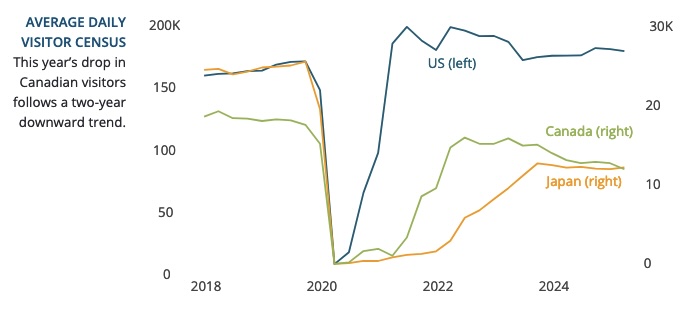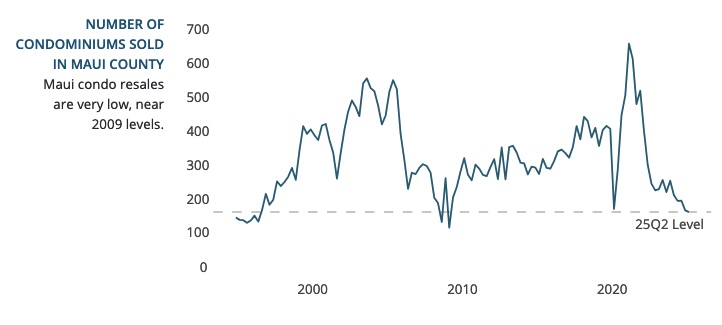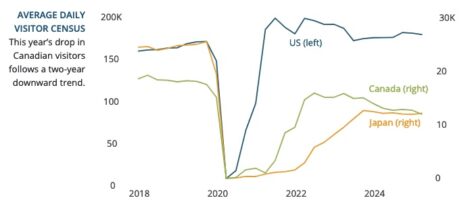New UHERO report forecasts recession for Hawaii’s economy

This line graph shows average daily visitor arrivals in Hawaii from the U.S., Canada and Japan. Courtesy photo
With visitor numbers down in Hawaii and new federal tariffs weighing down the global economy, economists at the Economic Research Organization at the University of Hawaii see few signs for optimism in the state’s economic outlook.
The latest report from UHERO says at least a mild recession is in store for the islands over the next year as almost all of the economic indicators remain bleak.
While the U.S. economy has defied many expectations and brushed off rising interest rates in recent years, that momentum hasn’t carried forward into 2025, according to assistant professor Steven Bond-Smith, who explained the latest data suggest the U.S. economy is “much weaker than previously thought.”
The report says a recession in the U.S. would only compound global weakness, while prolonged high tariffs, stricter immigration enforcement and deep federal spending cuts could intensify local impacts.
“Even if the recession proves shallow, higher prices and tepid growth will impose ongoing costs on Hawaii households,” the researchers wrote.
The report attributes the largest cause of economic uncertainty across the world to new tariffs. While standard trade agreements are predictable and set on longer terms, the volatile nature of the new tariffs has fueled uncertainty, slowed the economy and put the Federal Reserve in a tough position as it tries to gauge how to adjust interest rates.
As the U.S. economy slows, the report also points to declines in foreign tourism, most notably from Canada and Japan, as two major factors in Hawaii’s economy.
The report says that both Japan and Canada are equally important markets for the state, but tourism from Japan has never fully recovered after the pandemic, and the number of visitors coming from Japan remains stuck at less than half of what it was in 2019. Additionally, Canadian arrivals are now down by as much as 9% this year due to Canada’s recession.
Because of the decline in visitors, Hawaii experienced “a soft summer” of tourism. Bond-Smith said the downturn was seen statewide, “but the significant decline since spring implies that spending is now about as weak as it was immediately after the Maui wildfires.”
The report also says the market for condos is the weakest it has been since 2010, partly because of high mortgage rates and surging insurance costs, and also because of uncertainty over Bill 9, a proposal to phase out transient vacation rentals in apartment districts on Maui.

This graph tracks the number of condos sold in Maui County. Courtesy photo
In fact, the report says construction remains “the only major source of strength,” with the sector being supported by federal and large public projects.
UHERO expects that “a mild Hawaii recession is imminent” and there will be contraction in payroll jobs, real GDP and personal income, combined with higher inflation. The economic forecast predicts a gradual recovery will begin by late next year.





